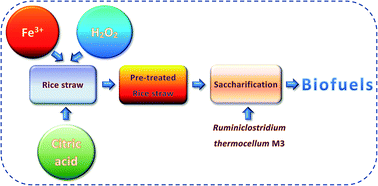Fenton pre-treatment of rice straw with citric acid as an iron chelate reagent for enhancing saccharification†
Abstract
The Fenton reagent has recently been verified as being effective for lignocellulose pretreatment. However, the Fenton reaction can only work under acidic conditions, leading to severe environmental pollution and increasing the cost for sewage treatment. This has made identification of iron chelates that could enhance Fenton degradation under neutral conditions important. In this study, citric acid, a non-toxic polyhydroxy carboxylic acid, was introduced as an iron chelate in Fenton pre-treatment of rice straw. Results demonstrated that citric acid has the ability to (i) maintain the oxidation capacity of the Fenton reagent under near-neutral conditions, (ii) enhance the degradation of lignin and reduce the crystallinity of rice straw from 0.41 to 0.21, (iii) promote the saccharification of rice straw (the maximum saccharification ratio of 35.7% was two-fold higher than that for the untreated rice straw), and (iv) elevate the maximum activity of β-glucosidase from 0.33 IU mL−1 to 0.61 IU mL−1. Moreover, the effect of operational parameters such as pH and processing time on the saccharification of rice straw by Fenton pretreatment with and without citric acid has been demonstrated. The findings strongly support Fenton plus citric acid as an efficient and environmentally friendly lignocellulose pretreatment method.



 Please wait while we load your content...
Please wait while we load your content...